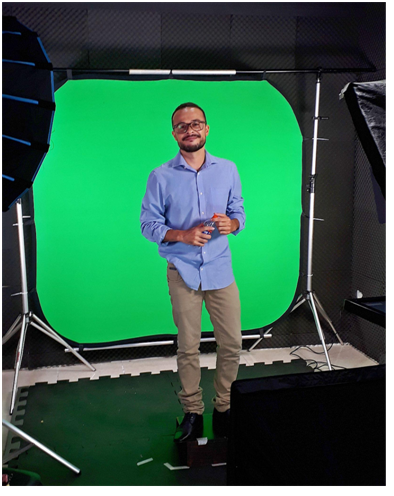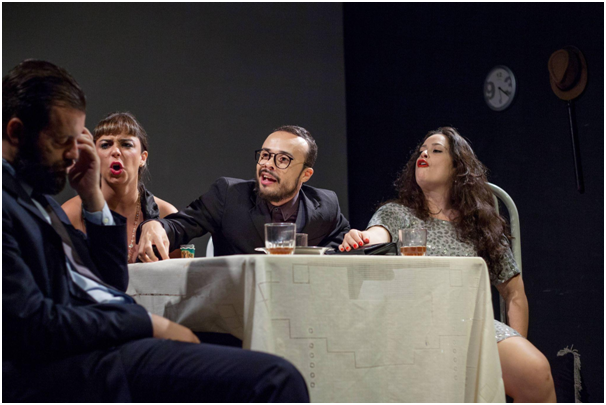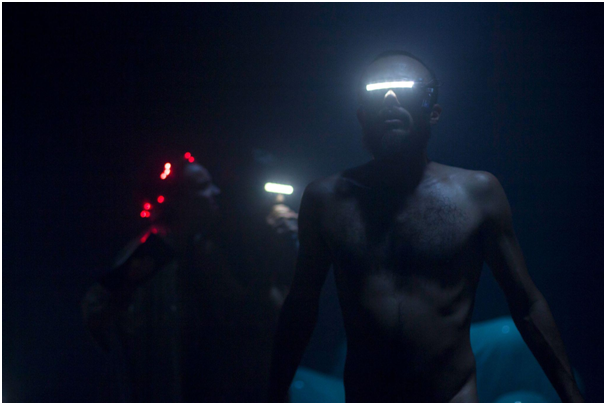ENTERTAINMENT COLUMN
Article prepared by Thiago Freitas, university student at ECOM/IDP
Welcome to ENQUADRAMENTO, the new section of ENTRETÊM, Comunica’s Art and Entertainment column. Here, our main objective is to frame artists from the Federal District beyond their CVs, we will bring their experiences, their projects, their inspirations and their dreams. And, to start with a flourish, let's look at Josuel Júnior, actor, cultural producer, teacher, a versatile artist.

We are talking about an artist with more than twenty years of career. Even so, it is extremely possible that a large part of Brasilia residents have already been reached by Josuel's work at some point. So, our framework begins with Josuel’s childhood.
In the conversation between ENTRETÊM and Josuel, it is evident that he was a child whose childhood was based on imagination. And this is not only our perception, but also an affirmation of himself. At the age of eight, Josuel watched the soap opera “Tieta”, which was rerun every afternoon from Monday to Friday. For him, the entire narrative was new, but for his relatives, nothing was new. The first door to the artistic space opened there, when he realized that it was fiction, it was entertainment, it was art, even the distressing death of the characters in a sand hurricane, everything was poetic.
We asked the question that every artist must hear at some point in their life: have you always thought about being an artist? From this question forward, Josuel proved to be an extremely down-to-earth artist. Not only due to his awareness of himself and his artistic processes, but to understand that the roots of his artistic construction are in the social context of Samambaia, Josuel's hometown.
In the early 2000s, at the age of fourteen, the entertainment on the outskirts was often religious movements and, thus, Josuel encountered the Passion of the Black Christ. It operated as a summer school, running from January until the eve of Easter, and even with the Christian text, the workshop was held with teachers from Faculdade Dulcina de Moraes and technical courses.
Theatrical immersion in adolescence made Josuel a different person. In the Passion of the Black Christ workshops, experience with other bodies, other people and other ages made even behavior at home improve a lot. In addition to disinhibition and postural correction, of course.
The family's acceptance of Josuel's relationship with the theater was complete, mainly due to the free nature of the program. Josuel told us that, more than once, he heard at home: "Are you going to miss this weekend knowing that others want to participate?" A few years later, Josuel's entire family also joined the Passion of the Black Christ, where he went from being a student to becoming a teacher, becoming his mother's teacher from 2004 to 2006. It was also in the Passion of the Black Christ that Josuel had the first contact with the Culture Support Fund (FAC). Something very clear to Josuel and which he also made a point of telling us is how the Passion of the Black Christ and the Quadrilhas are the driving force of Samambaia's culture, forming several artists who drink directly from these sources.
Even though Josuel's artistic career seemed clear to us since childhood, he revealed to us that after the Passion of Christ he still lived in professional limbo. He tried the entrance exam for sociology twice, then for literature, but was unable to enter the University of Brasília.
Until he saw an advertisement in the newspaper for a role in a soap opera. At 17, after meeting many people thanks to the Passion of the Black Christ, he already knew what those selections were like: little accessibility, very high fees to be paid, the hidden need to have been a student of well-known directors. Still, he wanted to understand that process. So, Josuel got in touch, took the test in Taguatinga and, with great effort and help from his family, raised the necessary money. He spent four to five months in Rio de Janeiro, where he found several good opportunities.
No resident of the outskirts of DF had done television on Rede Globo until then. As soon as he arrived, Josuel recorded a vignette for the soap opera “América”, as one of the pedestrians. The recording took place on a Friday and the vignette appeared on Saturday, everyone saw Josuel appear: family, friends, acquaintances. When he returned to Samambaia, he came back with a lot of baggage and Josuel embraces the opportunity to produce a film.
It was in this context that Josuel finally came face to face with his career in an interview with Rede TV!, when the reporter asked: “What are you?” producer of the film, but professionally, who was Josuel? He returned home and enrolled at Faculdade Dulcina de Moraes the next day.

Josuel, then, entered college as the student with the most baggage in the class and the biggest clash of opinions came, precisely, from the different artistic vision he had. While other students defended the idea of more traditional theater, drinking directly from canonical theoretical sources Grotowski and Stanislavski, Josuel discussed Tieta and other novels. In addition to the natural difficulties of a higher education course, the cost was too high for Josuel at that time. This situation would change when Professor Graça Veloso gave a seminar on Brazilian culture in the 80s. Josuel, obviously, decided to talk about television products: such as Xuxa, boybands/girlbands of the time and, of course, soap operas.
In this work, Josuel even promoted an Academic Paquitas Competition, in which only students from Dulcina and UnB participated. The more traditionalist and experienced people saw Josuel's work as an affront and did not understand the proposal he presented, but management began to look at him in a different way. For them, if Josuel could make all that noise in an academic seminar, he was someone who deserved to be accompanied and seen up close. Josuel won a scholarship and became a student producer at Dulcina. “I was a petulant student, but at the same time, I put myself forward” - Josuel told us when he finished telling us about his achievements thanks to the seminar.
Josuel's works present a list of personalities with whom he worked and developed incredible projects, but of the closest inspirations, he immediately highlighted the work of Zé Regino, actor, clown and director, with whom he took a clown course for more than two years. Zé, for Josuel, represented a lot of things: Pedro's father, who played the King of Gado; represented Brasilia theater in an essential way. Josuel also did not fail to mention Verônica Moreno, actress and personal friend, also about Túlio Guimarães, Plínio Mosca and André Amaro, who were the first to believe in the work of Josuel and Fábrica de Teatro.
Presenting at least one play a year, Josuel took a break due to exhaustion. He had no friends other than those directly involved with his work and who, recurrently, only talked about theater. The exhaustion was also added to the difficulties of the editing process, as generally he, living on the outskirts, arrived first at rehearsals as actors who lived in Plano Pilot was late. These questions were very exhausting and tired Josuel to the point of making him stop for a while.
Today he talks openly about these issues, puts them in clauses, in the contractual part, so that in addition to respect between the parties, there is also regulation and ethical treatment of the actors. With the experience gained, Josuel is now able to choose to work only with a good team that he trusts, when the days are clear and with fair fees for everyone.
Regarding the difficulties still encountered in his artistic work, Josuel surprises us once again with his response. “We need to take advantage of the pandemic and normalize shows at 8 pm!” - beginsJosuel. Night shows, which usually start at 9 pm, mean that the team's departure is always very hectic, as theater professionals may depend on public transport to get home. “I'm tired of being kicked out of the theater” - he adds. - “I want to be able to finish the show, take a shower and leave with decent clothes. I got tired of having to wear big clothes that hid the dirt and sweat to eat a hot dog at the Igrejinha”. As if expecting our surprise response, and already reading the political expectation of the response, he said a sentence that had a great impact on us:

This phrase was explained to us openly when Josuel told us more about the works that impacted him the most and which ones he would like to revisit after this pandemic moment.
As soon as we asked what work had the most impact on him, the immediate answer was “Dia de Visita”, directed by Francis Wilker and Nei Cirqueira. This was the first time he felt that a play was watched by the people of Brasília. Josuel recalled with us the pleasant surprise when people discovered he was in the cast, as the characterization did not allow for instant identification.
It was, for him, a great acting, aesthetic and production challenge. A work that Josuel revisited in these times of pandemic was “Peter Pan for grown-ups”, directed by Luana Proença. Today, he better understands the quality of the show, and how it would fill a room. At the time, for personal reasons, Josuel says he couldn't really understand the power of the show and that, even in current times, Peter Pan would bring a necessary lightness to the public.
Other shows would not have the same reception thanks to the political conflict in which the country is immersed. A lot of public was lost during the period from 2016 to today, Josuel told us. At the same time that this audience needs to be shaken to understand the political scenario, it also needs to be won over to return to the theater.
During the pandemic and as a teacher, Josuel found himself needing to make interesting video lessons for his students. “If I don't laugh, I don't have fun directing, I don't publish” - said Josuel. It was also a great time to post memories - the famous ThrowBackThursday (TBT) - to talk openly about other works that he would like to talk more about, but didn't have time. Josuel also used his voice to talk about how artists were suffering in these times, he started fighting in the category, he recommended articles, even reaching Jornal Nacional on TV Globo. “I was just reluctant about the issue online. I did one live, I refused others.” - he finished.
Listening to Josuel's story, we saw how he became a versatile and versatile artist. This made us question whether the fact that Josuel worked with so many modalities within art was necessary. And no, it wasn't just that. Josuel got involved in identifying himself, because he thought it wasn't that difficult to do. He was willing to take risks, he went there and learned, he did it and, if it worked, he continued, reaching the Josuel we know today.
Josuel, Frame by Frame!
- A song? Full Half Moon, Caetano Veloso.
- A movie? My first love.
- A series? Justice.
- A soap opera? Tieta.
- A play? NoctiLuzes, directed by: Sérgio Sartori.
- An actor? Lima Duarte.
- An actress? Fernanda Montenegro, from Central do Brasil to Zazá.
- A singer? Cazuza.
- A singer? Gal Costa.
- Best day of the week? Monday, Sunday is always so sad.
- Morning, afternoon, night or dawn? Night.
- Favorite craze? Watch and rewind stories to really understand what people are thinking.
- A taboo you would break? Male Nudity, they sacralize male nudity too much. The male artistic nude always hides the parts, as if he were a guardian angel.
- Cluster of dreams? A samba, people playing and meeting friends.
- A dream? Knowing that you have money in your account to pay.










Please Post Your Comments & Reviews